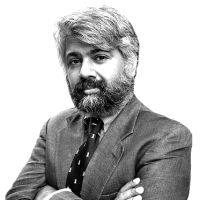
Facebook and Indians have a magnetic connection. Everyone in my family in India except my father—who, at 77, is entitled to his suspicions of the medium—is a Facebook user. Every single friend of mine in India—except for an eccentric Bengali writer who idolizes a 19th-century British viceroy, Lord Curzon, for which reason he cannot be said to have come to terms with the modern world—is a Facebook user.
Facebook “allows [Indians] to do two things they love: Tell everyone what they are doing; and stick their noses into other people’s business,” says Sree Sreenivasan.
Every single friend of mine of Indian origin, anywhere in the world, is a Facebook user. And a great number of my Facebook "friends" are Indians who, having read my journalism, or seen my name on a sibling's or (genuine) friend's page, have sought me out and "friended" me as a reflexive act of connection; and being of Indian origin myself, I've always found it infernally hard—if not virtually impossible—to say "no."
I recite these points because Facebook has just announced that it will shortly open an office in India—its first in Asia—in the southern city of Hyderabad. As an act of outsourcing, the news is unremarkable: Google, Dell, Oracle, IBM, and numerous others have already set up shop in Hyderabad. What catches the eye is that Facebook is, in some inchoate yet compelling way, "coming home"—to the land that embraces it most avidly, to that land where it truly belongs.
My argument is anecdotal and instinctive, as the numbers don't yet impress entirely. Of Facebook's 400 million users, only 8-and-a-bit million are in India. But consider the growth, and the context: There were only 1.6 million users in early 2008, and 3.5 million in early 2009; this in a land where there's little reliable Internet connection outside urban areas, and in which most computer users share a machine with several others. That the number of Facebook users has more than doubled by early 2010 is due largely to Facebook's concentration on mobile phone applications—a deeply shrewd move, given that there about 275 million cellphone users in India, a number projected to grow to a gargantuan 600 million by the end of 2011. Facebook is now also available in six Indian languages—Hindi, Punjabi, Bengali, Telugu, Tamil, and Malayalam (the language beloved of palindrome-lovers)—leaving it poised to penetrate deeply into those mofussil, or up-country, parts of India far removed from the English language and broadband.
But this story—and Facebook's continued growth in India—is not a prosaic one of devices, apps, and Internet penetration alone. It is about the Indian nature and temperament.
India is a land of the "open crowd"—to use Elias Canetti's idea from his landmark Crowds and Power—the type of crowd which, as soon as it comes together, "wants to consist of more people." As if in fulfillment of a social-media dream, "the urge to grow is the first and supreme attribute of [this] crowd… there are no limits whatever to its growth; it does not recognize houses, doors or locks and those who shut themselves in are suspect." (How else to explain the hurt notes, the messages of reproach, that one gets from Indians when one does not agree to "friend" them? "Sir," one man wrote to me, "I am really unhappy that you will not respond [to] the friendship request. I have admired your writing for several years. Also, I think we both hail from Tamil Nadu state. So please reconsider.")
Not wanting to rely entirely on the insights of Canetti, a Bulgarian-German who never set foot in India—and who died long before Facebook came to be—I consulted a couple of Indian experts on the subject. Prem Panicker, managing editor of Yahoo! India, said that Facebook's success in India had to do with "the whole 'community' thing. We, as a race, tend to herd together. This works two ways: hearing constantly that the world is on Facebook makes us want to be part of that herd. Secondly, we are sold on the idea of being able to rope in friends, even relatives, into a social circle with constant contact."
Social media was invented for Indians, says Sree Sreenivasan, a digital media professor at Columbia and co-founder of SAJA, the South Asian Journalists Association. "They take to it naturally and with great passion. It allows them to do two things they love: Tell everyone what they are doing; and stick their noses into other people's business." (The gregarious Prof. Sreenivasan, when last I checked, had 4,995 Facebook friends; he, his wife, and his father—a retired Indian ambassador to the U.N.—are all my Facebook friends. My wife and brother are the professor's friends, too. Q.E.D.)
Recent psychoanalytical writing would also appear to shed light on the Indian Facebook phenomenon. In "The Indians: Portrait of a People," Sudhir and Katharina Kakar dwell on the themes of separation and connection in the Indian psyche: "From religious rites to folk festivals, from the pious devotion of communal singing in temples to the orgiastic excesses of holi, the festival of colours, there is a negation of separation and a celebration of connection." This greater "relational orientation," the Kakars point out, can be seen clearly in Indian art: "In traditional Indian painting… man is not represented as a discrete presence but absorbed in his surroundings; the individual not separate but existing in all his myriad connections."
So should we think of Facebook as yet another canvas on which the Indian etches himself into an entwined crowd? One can see this art of connection on display on many Indian Facebook pages, where seemingly private conversations are conducted in a wide-open space. "I sacked the maid," an Indian "friend's" recent status update said. "Anyone know how I can find another fast?" "Should I wax or thread?" another asked, provoking, like the first questioner, a torrent of responses that other cultures might regard as intrusive or presumptuous.
Orkut, Google's social-networking service, may have flopped in the U.S., but it is thriving among the young in India—even as it starts to lose ground to Facebook, whose users cut across generational lines. (My mother is on Facebook, for example, but has not bothered with Orkut.) Twitter has exploded in India, too, especially as it allows users to follow absolutely anyone they please, from film stars to politicians—unlike Facebook, which requires acceptance. Shashi Tharoor, the country's junior minister for foreign affairs, has become a major national celebrity thanks to his tweets, the candor of some of which has got him into trouble with the fustier, unwired elements of the cabinet to which he belongs. Tharoor has nearly 700,000 followers, putting him in the top 10 of the world's tweeting politicians. (He is almost certainly the only one who writes every tweet himself.)
Prof. Sreenivasan of Columbia, no slouch on Twitter himself, says "I tell folks in the U.S. that you ain't seen nothing yet. Wait till Indians really combine their love of the cellphone with social media. Then, Facebook, Twitter, etc, will really explode.
"Take the Mumbai terrorist attacks in November 2008, for example, when so much fuss was made about how Twitter had 'truly arrived' with the way it was used during the attacks. Back then, Twitter worked in India only via smartphones and Web browsers, of which there was only a small number. Today, there are hundreds of millions of cell \phones. Imagine if they could all easily Facebook and Twitter via text message!"
Is it any wonder, then, that Facebook has gone to India—gone, I'd say again, to the place where it belongs?
Tunku Varadarajan is a national affairs correspondent and writer at large for The Daily Beast. He is also a research fellow at Stanford’s Hoover Institution and a professor at NYU’s Stern Business School. He is a former assistant managing editor at The Wall Street Journal. (Follow him on Twitter here.)





